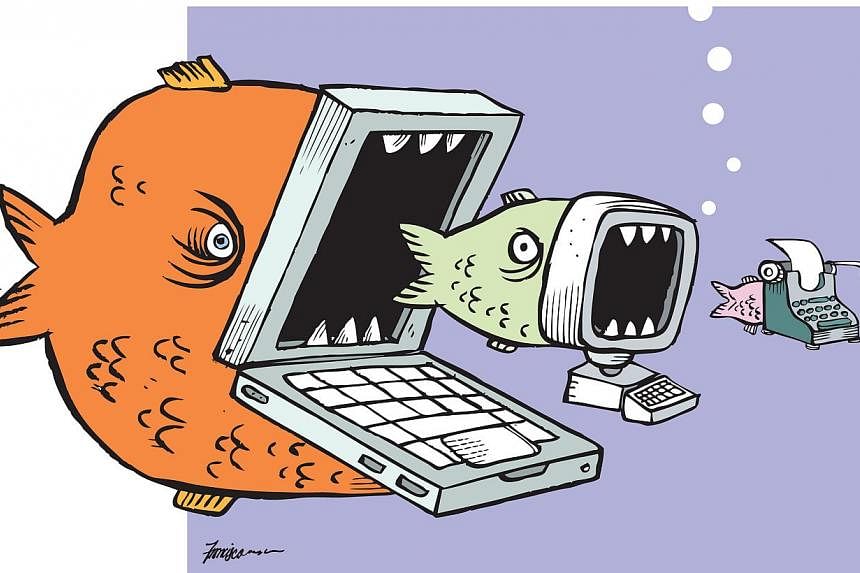I raise here the prospect of small and medium-sized enterprises (SMEs) around the world and across industries becoming collateral damage in the Innovation Wars or, to put it more mildly, Global Innovation Rat Race.
SMEs are helplessly squeezed between technology start-ups and global corporations in this battle. The stakes are high because the digital world follows "the winner takes all" economics.
Ambitious tech entrepreneurs, scattered across continents but united by common visions, are driving the worldwide start-up movement that is frantically re-imagining the century-old status quo first forged in the industrial revolution, and disrupting one industry after another.
Successive home-runs in mostly content-driven industries, for instance, shopping, music, books, photography, travel, movies and advertising, have emboldened the start-up community and its investors to pursue ever bigger ambitions.
The battle has barely started; next in the warpath for digital disruption are the more mainstream and lucrative industries of education, health care, telecommunications, television, manufacturing, transport, finance, automotive, defence, and more.
Tech giants, such as Apple, Google and Amazon, who were start-ups themselves not too long ago, have little respect for industry and geographic boundaries, and are leading the charge for an all-out war on traditional industries.
Mr Marc Andreessen, a widely respected venture capitalist, says: "Companies in every industry need to assume that a software revolution is coming.
Over the next 10 years, the battles between incumbents and software-powered insurgents will be epic."
As predicted by Microsoft co-founder Bill Gates in 1994 and recently echoed by DBS Bank chief executive Piyush Gupta, people will still need banking in the future but they will not need banks. In the same way, the world will still need education, retailing and manufacturing in the future but not the schools, retailers and manufacturers in the form we are familiar with today.
Nurtured by a deepening entrepreneurial ecosystem, start-ups in Singapore are also disrupting the status quo.
Reebonz (luxury e-commerce), RedMart (online grocery), Infinium Robotics (service robots), Vault Dragon (storage service), and MoolahSense (marketplace lending) are some notable examples. These start-ups are game-changers in their respective fields through the use of technology-powered business models that often enable them to be better, cheaper and faster than existing competition.
Now, global corporations are fighting back on multiple fronts. Their strategies include instilling an innovative and risk-taking culture in the organisation; adopting lean start-up practices; harnessing "crowd power" through open innovation; establishing global innovation centres; and creating venture funds-cum-accelerators to incubate, partner and invest in disruptive start-ups.
In recent years, local corporate powerhouses, including DBS, SingTel, MediaCorp, Singapore Press Holdings, StarHub and SingPost, have been undergoing digital transformation and adopting many of these defensive strategies.
For instance, SingTel committed $2 billion to form its new Digital Life arm in 2012. This unit, which includes the Innov8 venture capital fund, spearheads the group's efforts to develop new digital growth engines and invest in start-ups.
So, where does this leave SMEs? The Economist Intelligence Unit predicted that "mid-sized companies will be less common in 2020". It added that "technology advances will support a rise of micro-entrepreneurs in the decade ahead, and enable these tiny businesses to act like far larger ones.
This has direct implications for mid-sized companies, which will increasingly need to choose whether to become larger to compete on scale, or smaller to compete on speed".
Similarly in Singapore, the ability of local SMEs to exploit or, at least, withstand this intensifying technological revolution will be crucial.
In the foreseeable future, how will smaller retailers survive the escalating retailing war between e-commerce players such as Amazon, RedMart, Qoo10, Reebonz and the likes of FairPrice, Dairy Farm and Courts? How will private education providers continue to attract fee-paying students when online education platforms offer accredited programmes from top universities at a small fraction of conventional prices? As for providers of labour-intensive business services such as recruitment, research, translation, contact centre support, marketing and accounting, how will they overcome new-age virtual agencies powered by intelligent algorithms and operated entirely over the "cloud"?
How will traditional fleet-owning logistics, delivery and courier companies compete against peer-to-peer platforms that seamlessly connect customers and independent drivers?
I anticipate that, within the next five years, the six platform technologies of cloud computing, robotics, 3D manufacturing, Internet of Things, Big Data and smart algorithms will reach tipping point. This will create the perfect storm for innovation, new "digital blue oceans" and an explosion of novel business models. McKinsey Global Institute estimates that between US$14 trillion (S$17.8 trillion) and US$33 trillion of economic value will be created annually by 2025 as a result of disruptive technologies such as advanced robotics, next-generation genomics and new energy-storage devices.
Walmart chief executive Doug McMillon says: "Five years ago, Walmart was a retail company. Today, we are a technology company." My prediction is that enterprises of all sizes that succeed in the future will be those which position themselves as technology-first companies. Hence, I urge SMEs to start their innovation engines, imagine their exciting futures and capitalise on these powerful disruptive technologies. The alternative is to become collateral damage in the crossfire between the faster and the mightier.
The writer, a former trade diplomat, is the founding president of The Innovators Institute, an innovation company, and co-founder of The Innovators Network, an open networking platform which inspires innovation. Both are based in Singapore.

